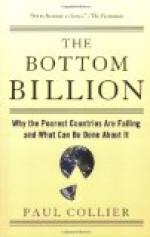Let me live in my house by the side of
the road
Where the race of men go by—
They are good, they are bad, they are
weak, they are strong,
Wise, foolish—so
am I.
Then why should I sit in the scorner’s
seat
Or hurl the cynic’s
ban?—
Let me live in my house by the side of
the road
And be a friend to man.
Sam Walter Foss.
From “Dreams in Homespun.”
FOUR THINGS
What are the qualities of ideal manhood? Various people have given various answers to this question. Here the poet states what qualities he thinks indispensable.
Four things a man must learn to do
If he would make his record true:
To think without confusion clearly;
To love his fellow-men sincerely;
To act from honest motives purely;
To trust in God and Heaven securely.
Henry Van Dyke.
From “Collected Poems.”
IF
The central idea of this poem is that success comes from self-control and a true sense of the values of things. In extremes lies danger. A man must not lose heart because of doubts or opposition, yet he must do his best to see the grounds for both. He must not be deceived into thinking either triumph or disaster final; he must use each wisely—and push on. In all things he must hold to the golden mean. If he does, he will own the world, and even better, for his personal reward he will attain the full stature of manhood.
If you can keep your head when all about
you
Are losing theirs and blaming
it on you,
If you can trust yourself when all men
doubt you,
But make allowance for their
doubting too;
If you can wait and not be tired by waiting,
Or being lied about, don’t
deal in lies,
Or being hated don’t give way to
hating,
And yet don’t look too
good, nor talk too wise:
If you can dream—and not make
dreams your master;
If you can think—and
not make thoughts your aim,
If you can meet with Triumph and Disaster
And treat those two imposters
just the same;
If you can bear to hear the truth you’ve
spoken
Twisted by knaves to make
a trap for fools,
Or watch the things you gave your life
to, broken,
And stoop and build ’em
up with worn-out tools:
If you can make one heap of all your winnings
And risk it on one turn of
pitch-and-toss,
And lose, and start again at your beginnings
And never breathe a word about
your loss;
If you can force your heart and nerve
and sinew
To serve your turn long after
they are gone,
And so hold on when there is nothing in
you
Except the Will which says
to them; “Hold on!”




